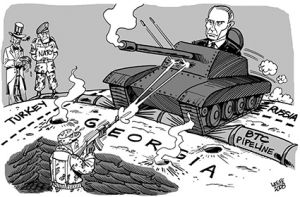Russian Visa‑facilitation and Wrestling with the EU
Last week, the Georgian Prime Minister’s Special Envoy for Russia, Zurab Abashidze, and Russia’s Deputy Foreign Minister, Grigory Karasin, met in Prague to discuss trade-economic, transport and humanitarian issues, including matters related to the occupation.
The Georgian government says that Zurab Abashidze raised issues of the systematic arrests of Georgian citizens in the Tskhinvali region, restriction of the Georgian language in educational institutions of the Gali district (Abkhazia) and the erection of wire fences in Georgia-controlled territories.
“It was underlined that Russia’s steps violate international law, as well as the territorial integrity and the principle of sovereignty of Georgia.”
The government added that trade revenue between the two countries has decreased by 8.9% during the last nine months, however, the trend in transfer of cargo and passengers from Georgia to Russia has been increasing.
In addition, the information released by the Russian Foreign Ministry concerning visa-facilitation for Georgian citizens has been confirmed. The Georgian government cited the Russian side is working on the topic.
Meanwhile, Georgian Prime Minister Irakli Garibashvili, talking with EurActiv regarding the country’s European future early this month, called the possible EU-visa liberalization “a logical next step.”
“Georgia’s path towards EU integration is irreversible. Some 80 percent of Georgians want closer relations with the EU. It was acknowledged that the benefits for the EU are obvious. Georgia is a success story for the Eastern Partnership and for EU soft power,” Garibashvili underlined. He emphasized that the logical next step on our European journey is visa liberalization. “This is fundamental to the implementation of our Association Agreement with the EU. Without visa-free travel across Europe for Georgians, we cannot make further progress on the people-to-people exchanges that will really cement EU values in our country and region.”
Analysis:
The rhetoric of Georgian civil society, opposition and openly pro-western parties is dissimilar from the one of the government, which claims a facilitated visa-regime will benefit Georgia, while the two countries have tough diplomatic relations over the Russian occupation. Moreover, the Russian side threw a subtle hint for the Georgian government to consider possible refurbishment of diplomatic relations, which were tarnished when Russia invaded Georgia back in 2008.
On the other hand, even a nascent eye can conclude that Russia’s efforts to drag Georgia into its sphere of influence is nontrivial. In fact, Russia has widely incorporated its ‘fifth column’ and soft power elements under the umbrella of its Orthodox church and “shared past”, notwithstanding the informational propaganda throughout the country largely disseminating anti-western ideals among citizens of Georgia.
Has the Karasin-Abashidze format become a quasi diplomatic channel for the two countries? Will the Georgian people and citizens of Georgia fall prey to Russia’s tempting visa-facilitation? Will the EU, instead, make a real step in December to liberalize the visa-regime for Georgia?
Zviad Adzinbaia












